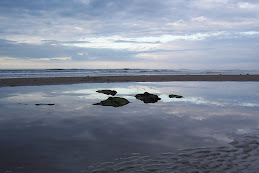I have been watching Art of America on BBC4. In the last programme (I saw) the lovely Andrew Graham-Dixon was exploring the work of abstract painters and it occurred to me, where were the abstract movements in literature?
Perhaps poetry is closer to visual art than prose. I can see how some poems could be said to be part of an abstract vision in that they attempt to capture the essence of a thing or a moment, to grasp what's inside rather than what's perceived from the outside.
But novels appear to be less conducive to such experimentation. Apart from a few notable exceptions, we still write novels in the same way as we did when the 'first' ones took this country by storm in the 1700s. As a writer I've struggled to conceive of how to create a narrative which is only about essence, and as a reader I wonder whether I would accept such abstraction. Would I not miss the comfort of being taken by the hand through a story?
Wednesday
Tuesday
A couple of weeks ago I went to 'Anniversary - an act of memory', a performance piece celebrating the Universal Declaration of Human Rights created by Monica Ross. There was something compelling about the experience, however, I couldn't help thinking that the declaration is perhaps showing its age.
Proclaimed by the United Nations General Assembly on the 10th of December 1948, it was born out of war and conflict. A key phrase comes in its preamble: 'Whereas disregard and contempt of human rights have resulted in barbarous acts which have outraged the conscience of humankind...'
There are still barbarous acts in this world of ours, yet, it seems to me, that the declaration no longer covers all the bases - and, indeed, sometimes came over as anachronistic. Article 17: 'Everyone has the right to own property...' and Article 23: 'Everyone has the right to work, to free choice of employment...' come to mind.
But for me it was mainly what was missing: the rights of our planet and our duties and responsibilities to it and to each other.
The preamble, with its repeated use of 'Whereas' has an almost poetic feel to it. I would suggest a few additions to it:
Whereas we are part of a larger family than the human one.
Whereas we rely on the bounty of the earth and her gifts.
Whereas we are not owners of our planet but custodians.
Whereas we have responsibilities as well as rights.
Whereas we acknowledge our mistakes of the past, let us learn from them.
I still feel the article which poses the greatest challenge is Article 29 which attempts to address the problem that our 'rights' often conflict with those of others. Maybe if the earth's rights became more central, this would be a way through such tensions and contradictions.
Proclaimed by the United Nations General Assembly on the 10th of December 1948, it was born out of war and conflict. A key phrase comes in its preamble: 'Whereas disregard and contempt of human rights have resulted in barbarous acts which have outraged the conscience of humankind...'
There are still barbarous acts in this world of ours, yet, it seems to me, that the declaration no longer covers all the bases - and, indeed, sometimes came over as anachronistic. Article 17: 'Everyone has the right to own property...' and Article 23: 'Everyone has the right to work, to free choice of employment...' come to mind.
But for me it was mainly what was missing: the rights of our planet and our duties and responsibilities to it and to each other.
The preamble, with its repeated use of 'Whereas' has an almost poetic feel to it. I would suggest a few additions to it:
Whereas we are part of a larger family than the human one.
Whereas we rely on the bounty of the earth and her gifts.
Whereas we are not owners of our planet but custodians.
Whereas we have responsibilities as well as rights.
Whereas we acknowledge our mistakes of the past, let us learn from them.
I still feel the article which poses the greatest challenge is Article 29 which attempts to address the problem that our 'rights' often conflict with those of others. Maybe if the earth's rights became more central, this would be a way through such tensions and contradictions.
Subscribe to:
Comments (Atom)

